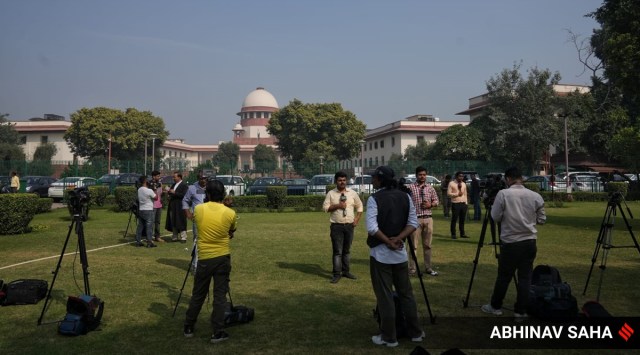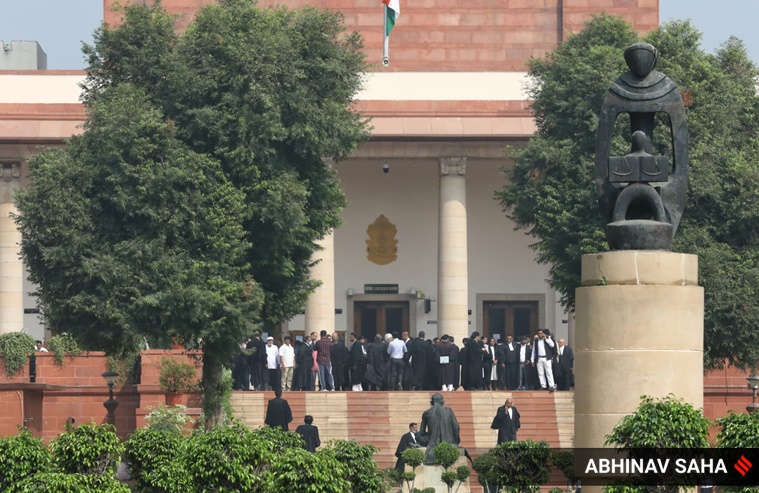The majority view, as enunciated by one of the five judges of the Constitution Bench, described reservation as “an instrument not only for inclusion of socially and educationally backward classes to the mainstream of society, but also for the inclusion of any class or section so disadvantaged”.

While Justices Dinesh Maheshwari, Bela M Trivedi and J B Pardiwala agreed that the amendment does not violate the basic structure of the Constitution, Chief Justice of India U U Lalit, who retires Tuesday, and Justice S Ravindra Bhat dissented, saying the EWS quota is “contradictory to the essence of equal opportunity” and “strikes at the heart of the equality code”.
Story continues below this ad
The dissenting judges were of the view that “while the ‘economic criteria’ per se is permissible in relation to access of public goods (under Article 15), the same is not true for Article 16, the goal of which is empowerment, through representation of the community”.
The five judges agreed that the provision gives the State the power to make special provisions in relation to admissions to private unaided institutions.
Justices Trivedi and Pardiwala also touched upon the concept of reservation as originally envisaged for a limited period and underlined the need to revisit and fine-tune it with the realities of the day. “Reservation,” said Justice Pardiwala, “should not be allowed to become a vested interest”.
Justice Maheshwari said, “Reservation is an instrument of affirmative action by the State to ensure an all-inclusive march towards the goals of an egalitarian society while counteracting inequalities; it is an instrument not only for inclusion of socially and educationally backward classes to the mainstream of society, but also for the inclusion of any class or section so disadvantaged as to be answering the description of a weaker section. In this background, reservation structured singularly on economic background does not violate any essential feature of the Constitution of India and does not cause any damage to the basic structure of the Constitution of India.”
He said “exclusion of the classes covered by Articles 15(4), 15(5) and 16(4)” – the Socially and Educationally Backward Classes (SEBC), Other Backward Classes (OBCs), Scheduled Castes (SCs) and Scheduled Tribes (STs) – “from getting the benefit of reservation as economically weaker sections, being in the nature of balancing the requirements of non-discrimination and compensatory discrimination, does not violate the equality code and does not in any manner cause damage to the basic structure of the Constitution of India”.
Story continues below this ad
Justice Maheshwari rejected the argument that providing the EWS quota over and above the 50 percent ceiling fixed by the Mandal Commission case will violate the basic structure, saying “that ceiling limit is not inflexible and in any case only applies to the reservations envisaged” for the already reserved categories “by Articles 15(4), 15(5) and 16(4) of the Constitution”.
He said the 103rd amendment “cannot be said to breach the basic structure of the Constitution by permitting the State to make special provisions, including reservation, based on economic criteria”.
 Lawyers gather as the Supreme Court pronounces the judgment on the EWS quota case. (Express Photo: Abhinav Saha)
Lawyers gather as the Supreme Court pronounces the judgment on the EWS quota case. (Express Photo: Abhinav Saha)
He said “the wide spectrum of distributive justice mandates promotion of educational and economic interests of all the weaker sections, in minimizing the inequalities in income as also providing adequate means of livelihood to the citizens. In this commitment, leaving one class of citizens to struggle because of inequalities in income and want of adequate means of livelihood may not serve the ultimate goal of securing all-inclusive socio-economic justice”.
“Viewing this affirmative action of EWS reservation from the standpoint of backward class versus forward class is not in accord with the very permissibility of compensatory discrimination towards the goal of real and substantive justice for all,” he said.
Story continues below this ad
Justice Maheshwari said that provisions contained in Articles 15 and 16 of the Constitution of India, providing for reservation by way of affirmative action, being of exception to the general rule of equality, cannot be treated as a basic feature.
He said “even if reservation is one of the features of the Constitution, it being in the nature of enabling provision only, cannot be regarded as an essential feature of that nature whose modulation for the sake of other valid affirmative action would damage the basic structure of the Constitution”.
Concurring with Justice Maheshwari’s opinion, Justice Trivedi said “as well settled, it must be presumed that the legislature understands and appreciates the needs of its own people. Its laws are directed to the problems made manifest by experience and its discriminations are based on adequate norms. Therefore, the constitutional amendment could not be struck down as discriminatory if the state of facts are reasonably conceived to justify it… The impugned amendment… is required to be treated as an affirmative action on the part of the Parliament for the benefit and for the advancement of the economically weaker sections of citizens”.
Justice Trivedi was of the view that “treating economically weaker sections of citizens as a separate class would be a reasonable classification, and could not be termed as unreasonable, or unjustifiable classification, much less a betrayal of basic feature or violative of Article 14”.
Story continues below this ad
Pointing out that “just as equals cannot be treated unequally, unequals also cannot be treated equally”, she said, “the Scheduled Castes, Scheduled Tribes and the backward class for whom the special provisions have already been provided in Article 15(4), 15(5) and 16(4) form a separate category as distinguished from the general or unreserved category. They cannot be treated at par with the citizens belonging to the general or unreserved category”.
“The impugned amendment creates a separate class of ‘economically weaker sections of the citizens’ from the general/ unreserved class, without affecting the special rights of reservations provided to the Scheduled Caste/Scheduled Tribe and backward class… Therefore, their exclusion from the newly created class for the benefit of ‘economically weaker sections of the citizens’ in the impugned amendment cannot be said to be discriminatory or violative of the equality code. Such amendment could certainly not be termed as shocking, unconscionable or unscrupulous travesty of the quintessence of equal justice as sought to be submitted by the counsel for the petitioners,” she said.
On the question of reservation for a timespan, Justice Trivedi said, “What was envisioned by the framers of the Constitution, what was proposed by the Constitution Bench in 1985, and what was sought to be achieved on the completion of 50 years of the advent of the Constitution, i.e. that the policy of reservation must have a timespan, has still not been achieved even till this day… we need to revisit the system of reservation in the larger interest of the society as a whole, as a step towards transformative constitutionalism.”
Justice Pardiwala agreed with Justices Maheshwari and Trivedi and said “reservation is not an end, but a means, a means to secure economic and social justice”.
Story continues below this ad
He said the “real solution… lies in eliminating the causes that have led to the social, educational and economic backwardness of the weaker sections of the community. This exercise of eliminating the causes started immediately after the Independence i.e. almost seven decades back and it still continues. The long-standing development and the spread of education have resulted in tapering the gap between the classes to a considerable extent.”
“As larger percentages of backward class members attain acceptable standards of education and employment, they should be removed from the backward categories so that the attention can be paid towards those classes which genuinely need help. In such circumstances, it’s very much necessary to take into review the method of identification and the ways of the determination of backward classes and also ascertain whether the criteria adopted or applied for the classification of backward is relevant for today’s conditions. The idea of Baba Saheb Ambedkar was to bring social harmony by introducing reservation for only ten years. However, it has continued the past seven decades. Reservation should not continue for an indefinite period of time so as to become a vested interest,” he said.



 Lawyers gather as the Supreme Court pronounces the judgment on the EWS quota case. (Express Photo: Abhinav Saha)
Lawyers gather as the Supreme Court pronounces the judgment on the EWS quota case. (Express Photo: Abhinav Saha)





